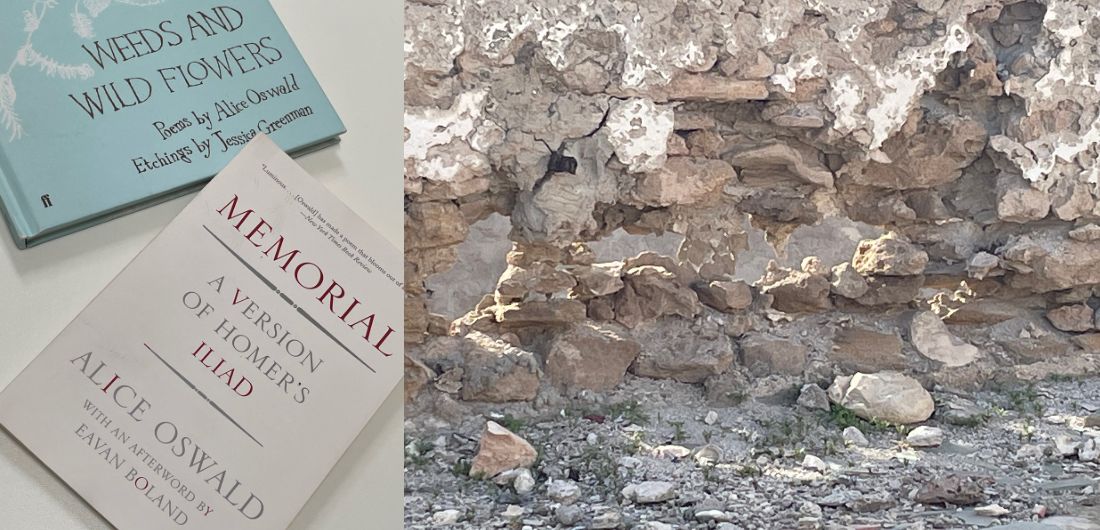Alice Oswald is a poet who turns to sound when thinking about poetry. In The Thunder mutters, an anthology of poems for the planet, she refers to the rake as an unpredictably rhythmical instrument of an acoustic ecology. A sort of exception to this emphasis on sound can be found in Weeds and Wild Flowers, a book of plant poetry which is a collaboration with Jessica Greenman. In her preliminary remark Oswald is careful to point out that Greenman’s etchings and her poems are actually two different books which for publication have been »shuffled together« into one book for the reader and »may be a reliable record of someone’s wild or wayside selves.«
Memorial, the translation Oswald calls her Excavation of the Iliad, forcefully transgresses this conscientious approximation of sound and image. To explore the meaning of »translating the atmosphere of the Iliad« she refers to the greek praise of its »energeia« which she renders into »bright unbearable reality«. Although reality is unbearable to look at it still forces itself into view by its sheer brightness: energeia, atmosphere.
When we start reading the poem we seem to enter into its depth led by a column of ancient names. Forming neither an arcade nor a colonnade it is only after several pages that the first line of verse provides a clue as to what to make of all these names:
The first to die was PROTESILAUS
Alice Oswald
Protesilaus’ name is at the top of the first page of columns. Like a flashlight, the following verses illuminate biographical splinters of this man’s life as they are showing up around his violent death when he was approaching the battlefield. On the sequence of biographical encounters appearing »as a kind of oral cemetery« Eavan Boland writes:
Each one comes with a nanosecond’s visibility, a camera flash of passionate lyric.
Eavan Boland
The mediating verses with their words take some of the speedy drive out of these repeated occurances of visibility, pushing them towards awareness — maybe immobilised in the form of photographic images, but maybe also still moving in form of scenic snippets. It is only the first poem that mentions — threaded along the first and last line like a black ribbon — that this dying took place a long time ago.
Sometimes, we get glimpses of how to identify those dead by whatever may have remained (»you can see the hole in the helmet«), but at the same time we know that this is not the report of an archeologist reviewing reliable death or witness records of the time with regard to excavated objects. It’s a lyrical voice created by a poet-translator for whom the Greek words work as
openings through which to see what Homer was looking at. I write through the Greek, not from it —aiming for translucence rather than translation.
Alice Oswald
Further reading:
❁ Weeds and Wild Flowers. Poems by Alice Oswald. Etchings by Jessica Greenman. London: Faber and Faber 2009.
❁ The Thunder Mutters. 101 Poems for the Planet edited by Alice Oswald. London: Faber and Faber 2005.
❁ Alice Oswald, Memorial. A Version of Homer’s Iliad. With an Afterword by Eavan Boland. New York, London: W. N. Norton 2012 [British Edition: Memorial. An Excavation of the Iliad. London: Faber and Faber 2011]. See p. 9, p. 83, p. x.
